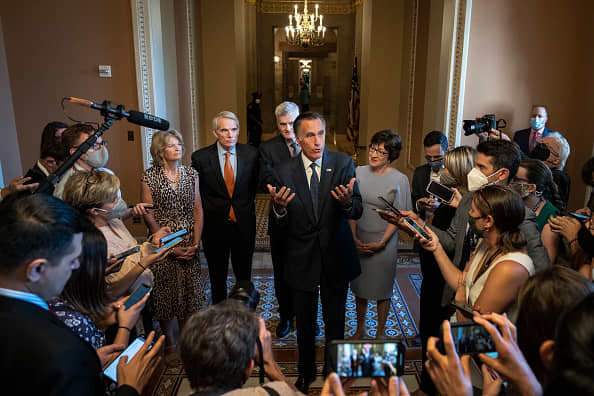
The lead GOP negotiators on the bipartisan infrastructure legislation speak to reporters after meeting privately with Senate Minority Leader Mitch McConnell (R-KY) at the U.S. Capitol on July 28, 2021 in Washington, DC. T
Drew Angerer | Getty Images
The Senate voted Wednesday to advance a bipartisan infrastructure plan, a critical step toward Democrats passing their sweeping economic agenda.
Senators voted 67-32 to push the bill forward; 17 Republicans and all 50 Democrats voted yes.
The vote opens the process to debate and amend the proposal, which would put $550 billion into transportation, broadband and utilities. While senators who backed the procedural motion could oppose a final package, Wednesday’s vote bodes well for its chances of passage.
The deal came together earlier in the day after Democratic and Republican negotiators resolved disputes over transit and broadband funding, among other issues. The plan was trimmed from the $579 billion in new spending senators and the White House agreed to last month — a sum many Democrats considered paltry.
Supporters of the bill have hailed it as a needed investment that will boost the economy as the U.S. tries to emerge from the coronavirus pandemic. Democrats still face a range of pitfalls as they try to get the bipartisan bill and their separate $3.5 trillion spending package to President Joe Biden‘s desk in the coming months.
Senate Majority Leader Chuck Schumer, D-N.Y., will have to keep all 50 members of his caucus and at least 10 Republicans on board to ensure the infrastructure plan passes. House Speaker Nancy Pelosi, D-Calif., will need to win progressive support for the smaller-than-desired bill in a narrowly divided chamber.
A second, separate $3.5 trillion plan to invest in child care, paid leave, education and measures to curb climate change could pose more problems. Every Democrat in the Senate will need to support the package to pass it without Republican votes.
Some Democrats, such as Kyrsten Sinema of Arizona, have signaled they want a smaller final budget reconciliation bill. Sinema was the lead Democratic negotiator on the bipartisan bill.
Attempts to appease centrists could alienate liberals who worry the bipartisan infrastructure bill fails to do enough to address climate change or strengthen the social safety net.
Schumer aims to pass both the bipartisan bill and the budget resolution that sets up the reconciliation process before the Senate leaves for its recess next month. The Senate will have to rush to pass both measures on Schumer’s timeline in an institution not known for speed.
Pelosi has insisted she will not bring the infrastructure bill or budget measure to the House floor until the Senate passes both of them.




